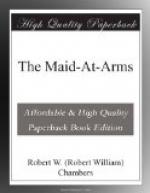“Stoner reports that all the Iroquois are making ready for some unknown rite, sir. He saw pyramids of flat river-stones set up on hills and he saw smoke answering smoke from the Adirondack peaks to the Mayfield hills.”
“What did Timothy Murphy observe?” asked Schuyler, watching Mount intently.
“Murphy brings news of their witch, Catrine Montour, sir. He. chased her till he dropped—like all the rest of us—but she went on and on a running, hop! tap! hop! tap! and patter, patter, patter! It stirs my hair to think on her, and I’m no coward, sir. We call her ’The Toad-woman.’”
“I’ll make you chief of scouts if you catch her,” said the General, sharply.
“Very good, sir,” replied Mount, pulling a wry face, which made us all laugh.
“It has been reported to me,” said the General, quietly, “that the Butlers, father and son, are in this county to attend a secret council; and that, with the help of Catrine Montour, they expect to carry the Mohawk nation with them as well as the Cayugas and the Senecas.
“It has further been reported to me by the Palatine scout that the Onondagas are wavering, that the Oneidas are disposed to stand our friends, that the Tuscaroras are anxious to remain neutral.
“Now, within a few days, news has reached me that these three doubtful nations are to be persuaded by an unknown woman who is, they say, the prophetess of the False-Faces.”
He paused, looking straight at Dorothy.
“From your knowledge,” he said, slowly, “tell me who is this unknown woman.”
“Do you not know, sir?” she asked, simply.
“Yes, I think I do, child. It is Magdalen Brant.”
“Yes,” she said, quietly; “from childhood she stood as prophetess of the False-Faces. She is an educated girl, sweet, lovable, honorable, and sincere. She has been petted by the fine ladies of New York, of Philadelphia, of Albany. Yet she is partly Mohawk.”
“Not that charming girl whom I had to dinner?” I cried, astonished.
“Yes, cousin,” she said, tranquilly. “You are surprised? Why? You should see, as I have seen, pupils from Dr. Wheelock’s school return to their tribes and, in a summer, sink to the level of the painted sachem, every vestige of civilization vanished with the knowledge of the tongue that taught it.”
“I have seen that,” said Schuyler, frowning.
“And I—by your leave, sir—I have seen it, too!” said Mount, savagely. “There may be some virtue in the rattlesnake; some folk eat ’em! But there is none in an Indian, not even stewed—”
“That will do,” said the General, ignoring the grim jest. “Do you speak the Iroquois tongues, or any of them?” he asked, wheeling around to address me.
“I speak Tuscarora, sir,” I replied. “The Tuscaroras understand the other five nations, but not the Hurons or Algonquins.”
“What tongue is used when the Iroquois meet?” he asked Dorothy.




